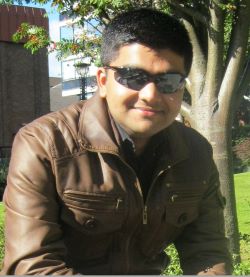Zaman Sajid

Research Fellow
Zaman Sajid is trained as an engineer and specializes in systems analysis and risk assessment, working at the intersection of ocean change, cumulative risk impacts, and coastal industries. Dr. Sajid has an interest in and experience working on sustainability, life cycle assessment, and energy and environmental policymaking.
Previous Education:
- Ph.D. in Process Engineering from Memorial University, Canada,
and has conducted research to develop dynamic environmental risk models for oil spills and offshore industries. - Master of Engineering degree from the University of Strathclyde, UK.
He is currently working as Research Fellow at the Memorial University of Newfoundland, Canada, leading an interdisciplinary research team to understand how ocean change contributes to the risk of mass die-off events in salmon aquaculture systems.
As a Research Associate at Nippon Foundation Ocean Nexus Center at the University of Washington, USA, he works on a collaborative project titled 'Global Change and Risk in Ocean Decisions'. In this project, he is investigating the impacts of climate change on the blue economy and how small climate change events can lead to catastrophic disasters for the blue economy and its habitats.
This work also provides a better understanding of contextual relationships of various environmental risk factors that can aid in risk-based decision-making.
Title of Project:
Global Change and Risk in Ocean Decisions
This project is based on investigating how climate change affects the blue economy. Tragically, the impact of climate change is not fair. People and industries least responsible for greenhouse gas emissions, such as offshore aquaculture and coastal communities, may suffer the most from climate change. The aquaculture industry contributes billions of dollars to a country's economy and produces relatively lesser carbon than the average onshore industries burning fossil fuels to meet their energy needs. However, the fate of the aquaculture industry is being decided by greenhouse gases emitted by onshore sectors. Suddenly, the aquaculture industry has to deal with unwanted gifts of warmer waters, melting of polar ice, rise in sea level, changing wind patterns, and ocean currents. Such changes are causing coral bleaching and ocean acidification and affecting the lives of marine species and their ecosystems. In short, climate change is changing the chemistry of seawater and causing catastrophic events such as killing millions of farmed fishes and eradicating habitats – putting the blue economy at the edge of survival. This project aims to explore such prospects.
Failure of aquaculture industries may lead to the loss of a country's whole economy, especially coastal communities. That's why making our blue economy more resilient is essential, which demands innovations such as farmed aquacultures resistant to sudden climate change. Digital tools are needed to help aquaculture industries adjust to the oceans' ever-changing conditions. Federal and provisional governments must provide financial protection to fish farming companies to protect them from catastrophic losses. This project aims to understand 1) how climate change affects the blue economy and how it can be made more resilient to coop such challenges. 2) how technology and rigorous policymaking can help protect the livelihoods of families and aquaculture companies that are in danger of losing to a rapidly changing climate. Considering these two aspects, we can avoid a climate disaster for our blue economy.